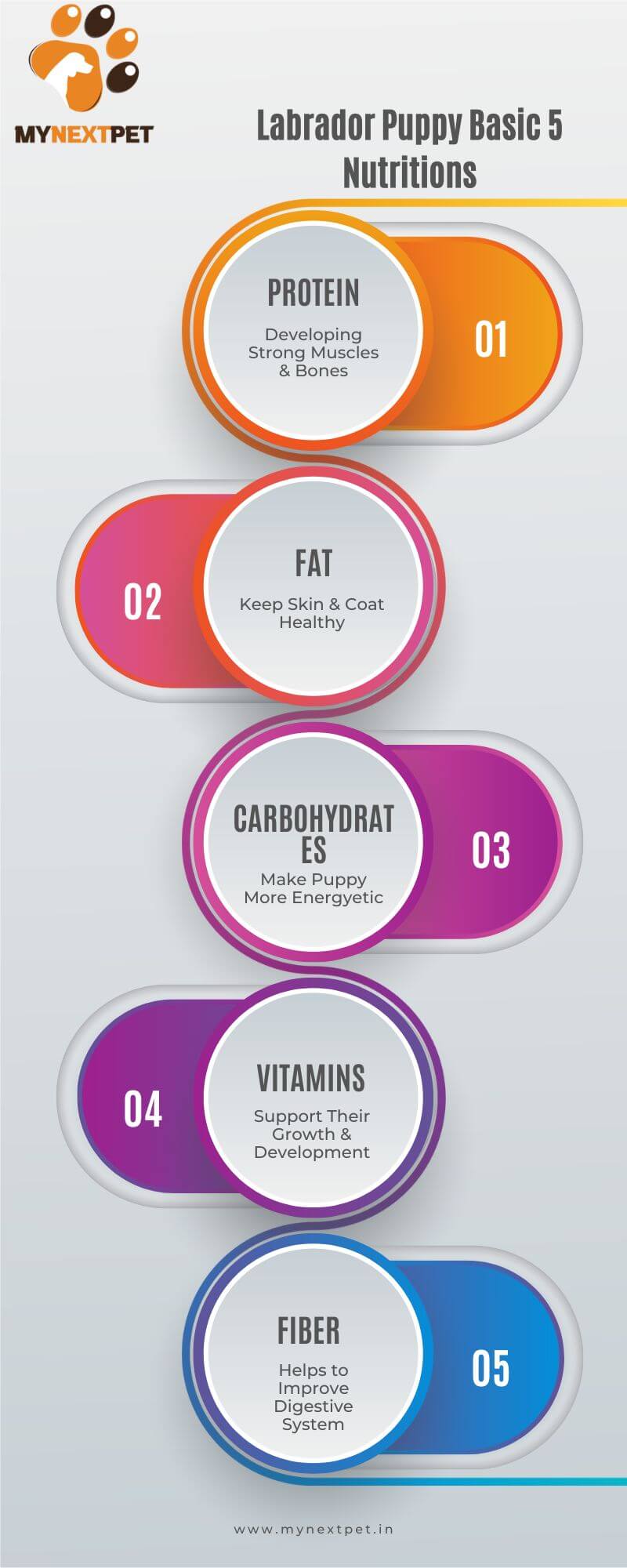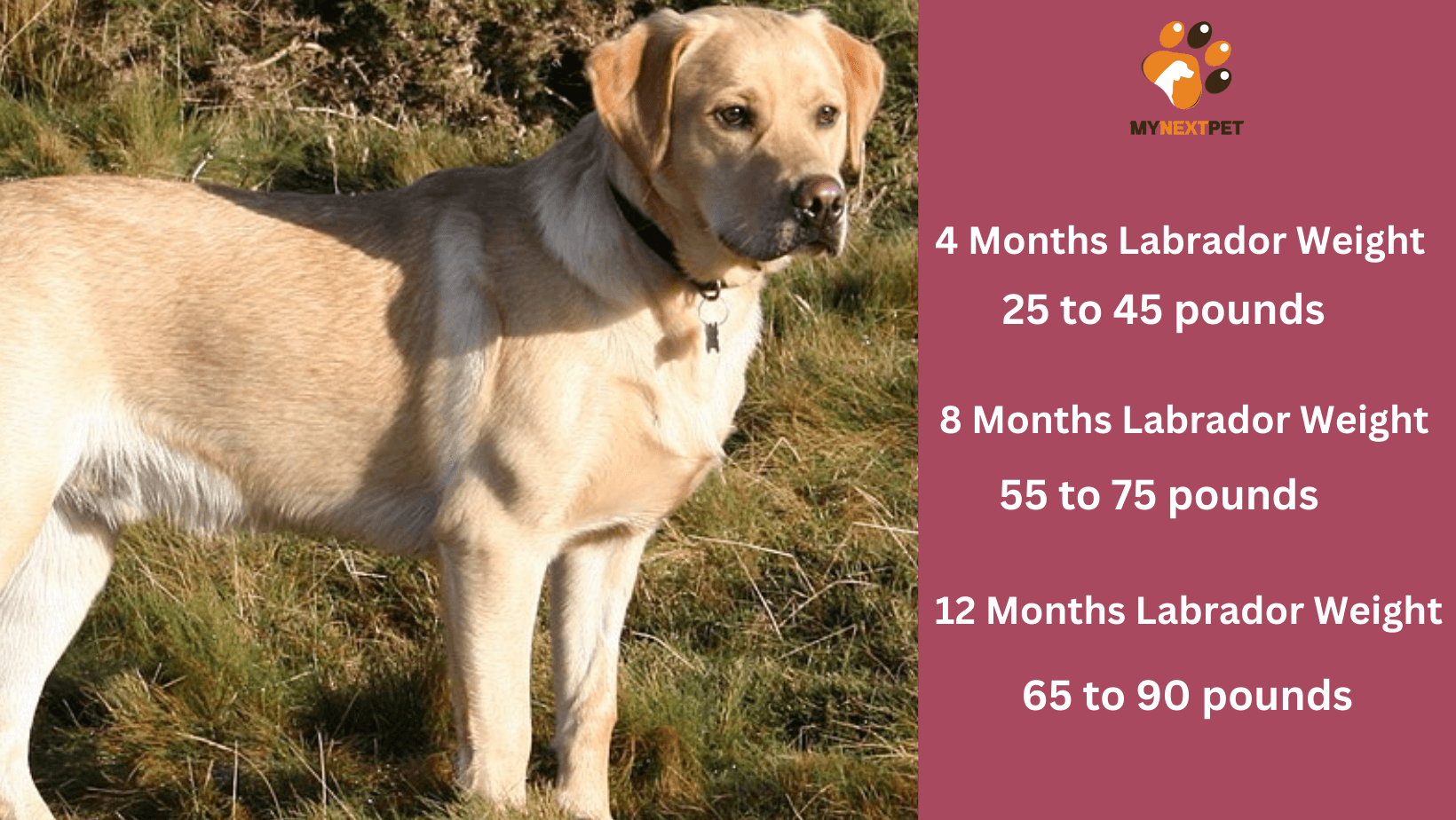Labrador weight is a very basic question in the Lab owners. Labrador puppies are adorable and playful but require proper care and attention to ensure their health and well-being. One crucial aspect of their care is monitoring their weight and providing adequate nutrition.
Keeping track of their weight and adjusting their diet is essential. A balanced and nutritious diet can help them to get the vital nutrients which help them to grow strongly.
In this article, we talk about their nutrition requirements, average weight by age, best exercise to drop or gain weight and possible reasons for the weight issues. Let’s dig into it.
Labrador Puppy’s Basic Nutrition Requirements
Different dog has a different nutrition needs and therefore small dog breeds required less nutrition compared to the medium or large breed dogs. Labrador puppies require a balanced and nutritious diet to support their growth and development. Below are the basic principles of nutrition for Labrador puppies.
- Protein: Protein is essential for developing strong muscles and bones in puppies.
- Fat: It is an important energy source for puppies, and it helps keep their skin and coat healthy.
- Carbohydrates: Carbohydrates provide a source of energy for puppies and help to keep them feeling full.
- Vitamins and Minerals: Puppies need a variety of vitamins and minerals to support their growth and development.
- Fiber: It is very significant to cater fiber rich food to your puppy to digestion. Fiber is very helpful to improve digestive system.

Foods To Gain Basic Nutrition For Labrador Puppies
When we come to the food of puppy, it is very important to know what are the foods required to your puppy for better physical development. if you do not know how much food does the lab puppy eat, you can read our informative article.
NON-VEG:
Chicken: Chicken is an excellent source of lean protein and can be easily incorporated into your Labrador puppy’s diet. Cooked and raw, both types of chicken are suitable, but cooked is preferable.
Fish: Fish is a good source of protein and omega-3 fatty acids, essential for maintaining healthy skin and coat.

VEG:
High-quality puppy food: A high-quality puppy food formulated explicitly for Labrador puppies is the best choice. Look for food which contains high proteins and others vitamins.
Sweet potatoes: Sweet potatoes are a good source of carbohydrates and contain vitamins A and C, essential for a puppy’s health.
Brown rice: Brown rice is a good source of complex carbohydrates and can provide energy for your Labrador puppy.
Vegetables: Vegetables such as carrots, green beans, and peas are good sources of vitamins and minerals for Labrador puppies.
Eggs: Eggs are a good source of protein and can be included in your Labrador puppy’s diet in moderation.
Newborn Labrador Puppy Ideal Weight

Newborn Labrador puppies usually weigh between 14 to 22 ounces (396 to 624 grams). However, the weight can vary based on the litter’s size, the mother’s health, and the puppies’ genetics.
If a newborn Labrador puppy weighs less than 14 ounces (400 grams), it may be considered underweight, and it is crucial to seek veterinary attention as soon as possible.
If a newborn Labrador puppy weighs more than 23 ounces, it is dangerous for a puppy to be this overweight.
If you are a small dog lover, you must have to know 15 Most Popular Types of Small Dog Breeds in India.
Labrador Weight at the Age of 4-12 Months

The weight of a Labrador puppy between the age of 4 to 12 months can vary depending on various factors such as gender, genetics, diet, and exercise. This age is the most crucial stage as they develop maximum in this gap.
At 4 months, a male Labrador weight may weigh 30-40 pounds (13-18 kg), while a female Labrador puppy may weigh 25-35 pounds (11-16 kg).
At 8 months, a male Labrador puppy may weigh between 65-75 pounds (29-34 kg), while a female Labrador puppy may weigh between 55-65 pounds (25-29 kg).
At 12 months, a male Labrador puppy may weigh between 75-90 pounds (34-41 kg), while a female Labrador puppy may weigh between 65-75 pounds (29-34 kg).
This is the average weight of Labrador dog, it can be more or less by your dog’s health and appearance.
Labrador Weight at the Age of 3-5 Year
On average, a healthy middle-aged dog should maintain a body condition score (BCS) of 4-5 out of 9. A BCS of 4-5 means that the dog’s ribs are easily felt but not visible, the waist is visible from above, and there is an abdominal tuck.
Labrador Weight at the Age of 5-7 Year
The average weight for a Labrador between the ages of 5 to 7 years old can vary depending on various factors such as gender, genetics, diet, and exercise. However, on average, a healthy adult Labrador should weight between 55-80 pounds (25-36 kg), with males typically weighing more than females.
It’s important to note that individual Labrador Retrievers may weigh more or less than the given range depending on their overall health, body type, and level of physical activity.
Reasons For Overweight Of Labrador Dog
Overfeeding: Feeding your Labrador Retriever too much or giving them too many treats can lead to weight gain.
Lack of Exercise: A lack of regular exercise or physical activity can contribute to weight gain and obesity.
Health Conditions: Certain conditions, such as hypothyroidism, can cause weight gain in Labrador Retrievers.
Genetics: Some Labrador Retrievers may have a genetic predisposition to gaining weight more quickly than others.
Age: Labrador Retrievers may become less active and require fewer calories, so adjustments to their diet and exercise routine may be needed to maintain a healthy weight.
Human Behaviour: Overfeeding or giving in to begging behaviour can contribute to weight gain in Labrador Retrievers.
Solution To Counter Overweight Problems
Monitor Food Intake: Feed your puppy the recommended amount for their age and weight, and measure their food portions to avoid overfeeding.
Choose a High-Quality Dog Food: Look for a dog food specially formulated for puppies and contains high-quality ingredients, such as lean protein and whole grains.
Limit Treats: Treats should be given sparingly and should not make up a significant portion of your puppy’s diet. You can also use low-calorie treats or vegetables as treats.
Exercise Regularly: Regular exercise is essential for maintaining a healthy weight. Take your puppy for walks or play games with them to encourage physical activity.
Consult with a Veterinarian: They can provide advice on diet and exercise and help create a plan to manage your puppy’s weight.
If you are going to buy this breed and looking for the maintenance cost of labrador dog in india, you have to checkout descriptive article.
Reasons For Underweight Of Labrador Puppy
Poor nutrition: If the dog is not getting enough high-quality food or nutrients, it may not be able to gain weight properly.
Illness: Illnesses such as worms, infections, or digestive issues can affect a dog’s ability to absorb nutrients and lead to weight loss.
Dental problems: Dental problems such as tooth decay or gum disease can make it difficult for a dog to eat, leading to weight loss.
Stress: Stress or anxiety can cause a dog to lose their appetite, leading to weight loss.
Parasites: Parasites such as fleas, ticks, or mites can cause a dog to lose weight as they can drain the dog’s blood or cause itching and discomfort.
Ageing: As dog’s age, their metabolism slows, and they may need fewer calories, leading to weight loss.
Solutions For Countering The Underweight Issues
Improve their diet: Ensure that your dog eats a well-balanced, high-quality diet rich in protein and nutrients.
Increase their food intake: Increase the amount of food you are giving your dog gradually, and monitor their weight gain.
Provide frequent meals: Consider dividing their daily food portion into several small meals throughout the day. This can help stimulate their appetite and prevent overeating.
Consider supplements: You can use a multivitamin in their diet to ensure they get all the necessary nutrients.
Treat underlying health issues: If your dog’s underweight is caused by an underlying health issue such as a digestive problem or illness, it’s essential to treat the underlying cause.
Provide a stress-free environment: Ensure your dog is living in a stress-free environment by providing enough exercise, playtime, and rest.
Daily Exercises Used To Maintain Their Weight
Daily walks: Take your Labrador for a daily walk, ideally for at least 30 minutes.
Running: Labrador dogs enjoy running and playing, and it’s a great way to burn calories.
Swimming: Labrador dogs are natural swimmers, and swimming is an excellent form of low-impact exercise.
Hiking: Hiking is a great way to get you and your Labrador dog to exercise.
Agility Training: You can enroll your Labrador dog in agility training or set up an obstacle course in your backyard.
Remember to start slow and gradually increase the intensity and duration of exercise as your Labrador dog gets used to it.
In conclusion, proper weight monitoring and nutrition are crucial for the healthy development of Labrador puppies. As they grow, these puppies have specific nutritional needs that must be met to ensure that they reach their full potential in terms of size, health, and longevity. Overfeeding or underfeeding can result in various health problems, including obesity, skeletal abnormalities, and developmental issues. Therefore, it is essential to consult with a veterinarian or an animal nutritionist to determine the appropriate feeding schedule and diet for a Labrador puppy. By providing proper nutrition and weight monitoring, you can help your Labrador puppy grow up healthy and happy, and develop into a strong, active, and loving companion.
